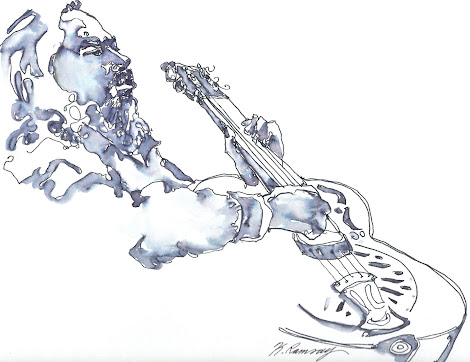 Duos are often more revealing than a full band. In a larger group, one member's vision can dominate. Or, by contrast, the personalities can smear together into an amalgamation without the rough edges. But a duo often presents a yin yang balance between two equals. If the match is close, it may emphasize the common ground, but magic can happen when two stronger visions come together. If the clash is not destructive, two perspectives can yield a rich sense of depth.
Duos are often more revealing than a full band. In a larger group, one member's vision can dominate. Or, by contrast, the personalities can smear together into an amalgamation without the rough edges. But a duo often presents a yin yang balance between two equals. If the match is close, it may emphasize the common ground, but magic can happen when two stronger visions come together. If the clash is not destructive, two perspectives can yield a rich sense of depth.Miss Shevaughn & Yuma Wray don't always succeed in smoothly merging her folky singer/songwriter sensibility with his harder edged garage guitar, but they do click often enough to create several special moments on We're From Here. The two clearly come from different worlds, but the long time they've spent on the road together has granted them a strong mutual respect and border crossing spirit. Neither musician's contribution can be summed up simply, but their strengths bolster one another.
Erin Frisby (Miss Shevaughn) has a fine voice that evokes the classic folk sounds of Linda Ronstadt or Emmy Lou Harris. When the tunes are more country, a touch of Patsy Cline comes out in her expressive phrasing. Confident yet vulnerable, she gives the material an emotional core. The opening track shows this off. From the simple folk start of Go Hang, her sweet but weary tone slides into your heart. Frisby carries her weight as a player, too. While her strength seems to be acoustic rhythm work, she has a nice touch at steel guitar and electric fills.
Chris Stelloh (Yuma Wray) balances Frisby's sentimentality with his electric guitar work. He seems happiest turning up the distortion and reverb to create a rich retro tone. On the subtle end, he can support a lonely melancholia with a Sleep Walk slide fill, like his backing on Go Hang. At the other extreme, he can build that into a richer garage rock, like he eventually does on Mi Burro Está En Fuego.That instrumental evolves a moody acoustic line into a Spanish flavored rock jam. The progression stays interesting, with tight breaks and fuzzy, single-coil accents. Throughout We're From Here, Stelloh's electric sound proves to be a strong companion to Frisby's rich vocals.
The centerpiece of the album shows off both players' strengths. The River Made Me Do It begins with a heat shimmer of sun-baked harmonica, creating a plaintive, lonely feel. The banjo and fingerstyle guitar lay down a dark, folk blues sound. The threatening undertone of droning bass creates a shadow of the deep woods that can hide a world of secrets. Frisby's voice is seductive, but a sense of doom clings to her words:
Well, the river made me do itWith the sonic memories of House of the Rising Sun and Brother, Can You Spare a Dime driving the groove, the tune offers up its moral lesson like an old style murder ballad. About halfway through, the band borrows a page from the Doobie Brothers' Black Water to lay down an interlocking a capella line ("Floatin' on by a dry county"). This sets up the electric guitar to drive the song forward like Jack White on a tear. Then Miss Shevaughn & Yuma Wray drop back to the folk blues simplicity and take us around again for the second half. Frisby's voice moans as the heavy guitar leads her to her fate to close the song.
Waltzed right in
And made himself at home
And when I looked into his eyes
I fell right in
And I'm a thousand miles gone
We're From Here's failures aren't fatal, but those strong tracks make songs like Make It Out Alive or Martha Ann sound weak and flawed. On the straight rocker, Make It Out Alive, Stelloh takes the lead vocal. Like The Replacements trying to write a Springsteen anthem, it feels derivative. Even though Stelloh gives his best, it lacks the chemistry of the duo. Similarly, Martha Ann's folky epitaph is pretty and Frisby's in her element, but it's missing the moody edge that Stelloh's guitar buzz adds elsewhere.
The closing track, Anniversary Song uses a different technique to show the duo's complementary nature. The main push of the song stays in the acoustic realm. Frisby's voice is full of longing and Stelloh's acoustic fills are tastefully restrained, maintaining the essential Linda Ronstadt vibe. When the song seems to end, there's a pause. Then we hear a brief sample of the band's alternate take as a reprise. Stelloh wrenches a low-fi haze from his distorted guitar, which contrasts with the clean single notes of acoustic. This hint at what might have been is just another way for Miss Shevaughn & Yuma Wray to show off their dualistic nature.

No comments:
Post a Comment